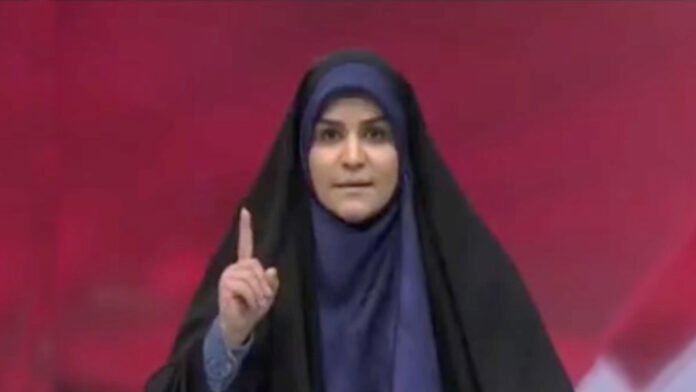Israel has attacked the Iranian state broadcaster IRIB and interrupted a live broadcast with an explosion, marking another escalation in the conflict with Tehran and replicating its previous attacks on news media targets in Gaza, the occupied West Bank and Lebanon.
TV anchor Sahar Emami denounced Monday’s “aggression against the homeland” and the “truth” as a blast went off and smoke and debris filled the screen. The footage then showed her fleeing the studio as a voice is heard calling, “God is greatest.”
The attack came shortly after the Israeli military issued a threat for Tehran’s District Three, where IRIB’s headquarters is located, and Defence Minister Israel Katz said: “The Iranian propaganda and incitement mouthpiece is on its way to disappear.”
Iran’s Ministry of Foreign Affairs spokesman Esmaeil Baghaei accused Israel of committing a “wicked act” that constitutes a war crime and of being the number one “killer of journalists and media people”.
The Committee to Protect Journalists (CPJ) has counted 178 journalists killed in Gaza by Israel since October 2023, making it the deadliest conflict for media workers ever recorded.
“The UNSC [United Nations Security Council] must act now to stop the genocidal aggressor from committing further atrocities against our people,” Baghaei wrote on X.
The CPJ said it was “appalled” by Israel’s attack on Iranian state TV and argued impunity for the killings of Palestinian journalists had “emboldened” the country to target media elsewhere. “This bloodshed must end now,” the organisation said on X.
Peyman Jebelli, the head of the Islamic Republic of Iran Broadcasting (IRIB), said the organisation’s headquarters was attacked because the Iranian media are “precisely targeting the depth of the enemy’s media strategy”.
In a statement quoted by the semiofficial Mehr News Agency, he said employees at the national media outlet “loudly declare” their determination to play their roles in the “hybrid war” initiated by Israel.
Iranian journalist Younes Shadlou said many of his colleagues were inside the building when the Israeli attack happened. “I don’t know how many of my colleagues are still inside right now,” he reported from outside the burning building in Tehran
“We had been given evacuation warnings, but everyone stayed until the very last moment to show the true face of the Zionist regime to the world.”
Al Jazeera’s Dorsa Jabbari said the strike was highly symbolic because it targeted an entity with close links to the Iranian government. “The head of the network is appointed by the supreme leader directly, so it is a significant part of the establishment,” Jabbari said.
“This is going to be a great shock for the Iranian people,” she continued. The station is located in a large, fortified complex that has a long history dating back to the 1940s. The channel is the most watched inside Iran, and Emami is a renowned anchor.
The attack should, therefore, be seen as “a huge message for Iran and the general public and [it] is going to create all kinds of fears”, Jabbari said.
Al Jazeera’s Tohid Asadi, reporting from Tehran, said Israel targeted a glass building known as the IRIB’s central building. The live broadcast was briefly disrupted, but Emami went back on TV shortly after the blast, which would likely increase her popularity, the journalist said.
The number of victims remains unclear.
Foad Izadi, professor of international relations at the University of Tehran, said he feared there would be “a lot of casualties” from the attack. “It’s a huge building,” he told Al Jazeera. “Iran’s news channel is located on the first floor. It has four floors, and on every floor, you have at least 200 to 300 people working.”
Izadi said he expected the attack to spark international outrage and be condemned by international media outlets.
The Israeli military confirmed in a statement that it has bombed the building of Iran’s state broadcaster in Tehran. “This centre was used by the armed forces to promote military operations under civilian cover, while using its own means and assets,” it said, without giving any evidence for its accusations.
Israel has a history of attacking media organisations and journalists, most recently in Gaza.
In October, it targeted Hezbollah-affiliated al-Manar TV studios in southern Beirut during a wave of strikes on Lebanon.
In May 2021, it targeted and destroyed the 11-storey al-Jalaa building in Gaza City, housing Al Jazeera and The Associated Press.
Shireen Abu Akleh, the Palestinian American Al Jazeera journalist, was killed by Israeli forces in May 2022 in Jenin in the occupied West Bank. She was a veteran television correspondent who became a household name across the Arab world for her bold coverage of the Israeli-Palestinian conflict.






